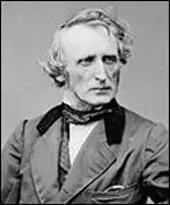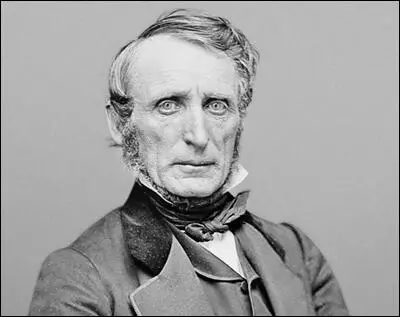John Bingham

John Bingham was born in Mercer, Pennsylvania, on 21st January, 1815. He worked in a printing office for two years before attending Franklin College, Ohio. He studied law and was admitted to the bar in 1840. Bingham worked as a lawyer in New Philadelphia, Ohio, before becoming the district attorney for Tuscarawas County (1846-49).
Bingham joined the Republican Party and was elected to the 34th Congress and served between March, 1855 to March 1863. An opponent of slavery, he said after the Battle of Bull Run that: "we need these reverses to bring our people up to the peril of not abolishing slavery."
An unsuccessful candidate for the 38th Congress, Abraham Lincoln decided in 1864 to appoint him as judge advocate of the Union Army. After the assassination of Lincoln, Andrew Johnson ordered the formation of a nine-man military commission to try the suspected conspirators. It was argued by Edwin M. Stanton, the Secretary of War, that the men should be tried by a military court as Lincoln had been Commander in Chief of the United States Army.
As Judge Advocate of the Union Army, Bingham, along with Joseph Holt, the Advocate General, had the task of helping present the government case against Mary Surratt, Lewis Paine, George Atzerodt, David Herold, Samuel Mudd, Michael O'Laughlin, Edman Spangler and Samuel Arnold.
The trial began on 10th May, 1865. The military commission included leading generals such as David Hunter, Lewis Wallace, Robert Foster, August Kautz, Thomas Harris and Albion Howe.
Bingham and Joseph Holt attempted to obscure the fact that there were two plots: the first to kidnap and the second to assassinate. It was important for the prosecution not to reveal the existence of a diary taken from the body of John Wilkes Booth. The diary made it clear that the assassination plan dated from 14th April. The defence surprisingly did not call for Booth's diary to be produced in court.

On 29th June, 1865 Mary Surratt, Lewis Paine, George Atzerodt, David Herold, Samuel Mudd, Michael O'Laughlin, Edman Spangler and Samuel Arnold were found guilty of being involved in the conspiracy to murder Abraham Lincoln. Surratt, Paine, Atzerodt and Herold were hanged at Washington Penitentiary on 7th July, 1865. Surratt, who was expected to be reprieved, was the first woman in American history to be executed.
Bingham was elected to the 39th Congress and over the next couple of years became one of the leading opponents of the new president, Andrew Johnson. A strong opponent of slavery, Bingham, like many people in the Republican Party, objected to Johnson's attempts to veto the Civil Rights Bill and the Reconstruction Acts. Bingham played an important role in the impeachment of Johnson and gave the closing, three-day summation.
In 1873 President Ulysses S. Grant appointed Bingham as his minister to Japan. He served in the post for twelve years and did not return to live in the United States until 1885. John Bingham died in Cadiz, Ohio, on 19th March, 1900.


